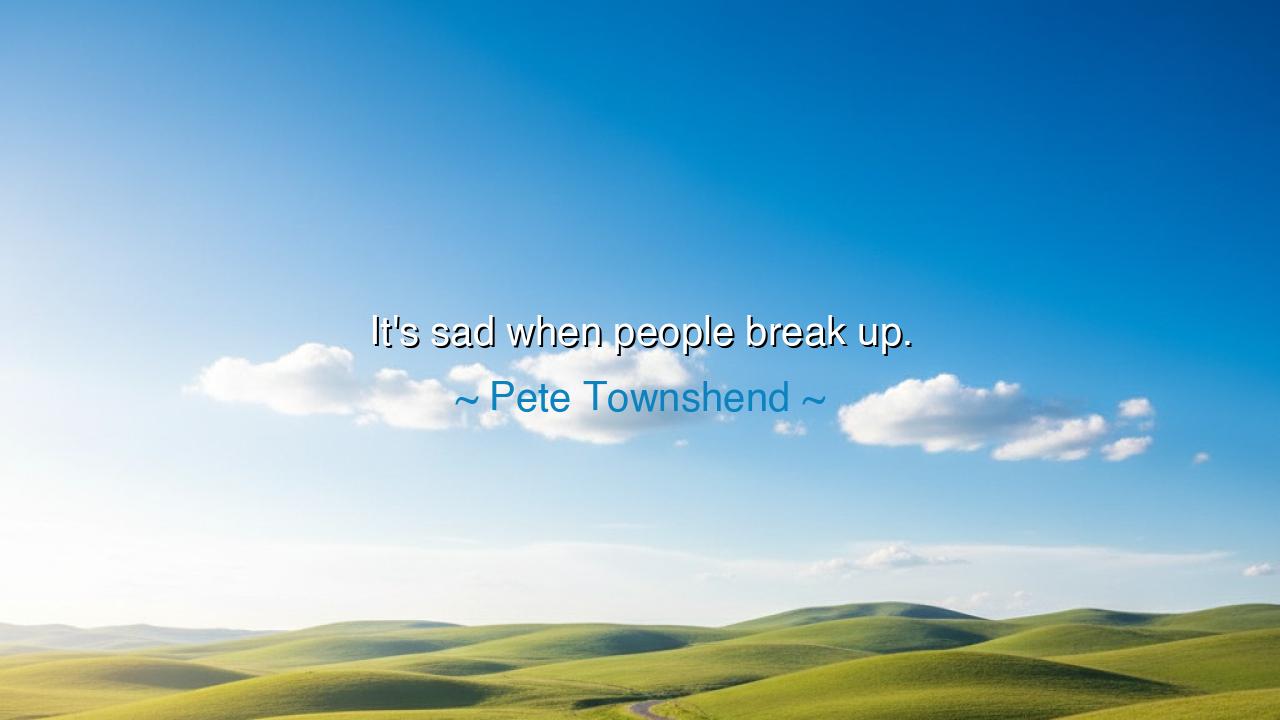
It's sad when people break up.






Pete Townshend, the philosopher of rock and chronicler of the human heart, once said with simple yet profound sorrow: “It’s sad when people break up.” In these few words lies a truth as ancient as love itself—the recognition that when two souls part, something more than a bond is lost. A small world collapses, a language of shared laughter and silent understanding vanishes into the air. Townshend, who wrote of passion, rebellion, and pain through the anthems of The Who, spoke not only of romantic endings but of the unraveling of human connection—that tender fabric that holds our lives together. His statement, brief as a sigh, carries the weight of universal grief.
The origin of this quote can be traced to Townshend’s own life and art. As a member of one of the greatest rock bands in history, he witnessed both creative unity and the strain that comes when egos, desires, and dreams collide. Bands, like relationships, are built on love and friction, trust and betrayal. Townshend’s lament may have sprung from observing not only lovers but also comrades whose shared purpose fractured under the burden of fame and fatigue. In that sense, his words echo beyond the personal—they are a meditation on the fragility of all human bonds. “It’s sad when people break up” becomes not just a statement about romance, but about the ache of separation in any form—friends, families, even nations.
The ancients, too, knew the sorrow of parting. They told of the myth of Orpheus and Eurydice, where love itself was torn apart by the boundaries of life and death. Orpheus, the musician, descended into the underworld to reclaim his beloved, only to lose her again by a single glance backward. His tragedy was not only that love was lost, but that love could not endure against the laws of time and fate. So too, when people break up—whether through choice, misunderstanding, or the quiet drift of years—they reenact this ancient pain. The sadness comes not merely from losing another, but from glimpsing the eternal truth that all things, even love, are fragile.
Townshend’s lament also holds a mirror to the human heart’s contradiction. We are beings built for connection, yet we often destroy what we cherish most. The sadness of breaking up is not only grief for what has ended but guilt for what we might have done differently. It is the recognition that every relationship—no matter how passionate—requires humility, care, and forgiveness, virtues that too often falter in the storm of pride or fear. In his music and words, Townshend always seemed to understand this tension: that love demands both fire and gentleness, and that when either burns too fiercely, the union turns to ash.
History offers us endless examples of this sorrow. Think of Abraham Lincoln and his cabinet, divided by ambition even as they sought to save a nation; or of John Lennon and Paul McCartney, whose partnership changed the world but whose friendship dissolved under the weight of fame. Their breakups were not simply personal—they were symbolic of how brilliance and love can coexist with conflict until one finally eclipses the other. Townshend’s words remind us that even the greatest unions—whether romantic, artistic, or political—carry within them the seed of separation. The sadness he names is the price we pay for the beauty of connection itself.
And yet, beneath his sorrow lies compassion. To call it “sad” is to acknowledge that every ending, however painful, deserves tenderness. For even when love fails, it proves that we once dared to open our hearts. Every breakup, in its quiet devastation, testifies to the courage of having loved at all. The melancholy wisdom of Townshend’s words invites us not to despair, but to honor what was real, even if it could not last. For the bond that breaks is never truly gone—it lingers in memory, in music, in the unseen fibers that continue to connect one soul to another.
So let this teaching be passed on: do not scorn the sadness of parting—it is the echo of love’s truth. When relationships end, mourn them with dignity, but do not let bitterness consume the beauty that once was. Learn from every heartbreak the art of compassion; learn to hold others more gently, to speak more kindly, to forgive more freely. For as Townshend reminds us, the breaking of bonds is a universal sorrow, but it is also a universal teacher. The heart that has been broken and healed does not harden—it deepens. And through that depth, we come to understand not only the pain of loss, but the sacredness of having loved at all.






AAdministratorAdministrator
Welcome, honored guests. Please leave a comment, we will respond soon